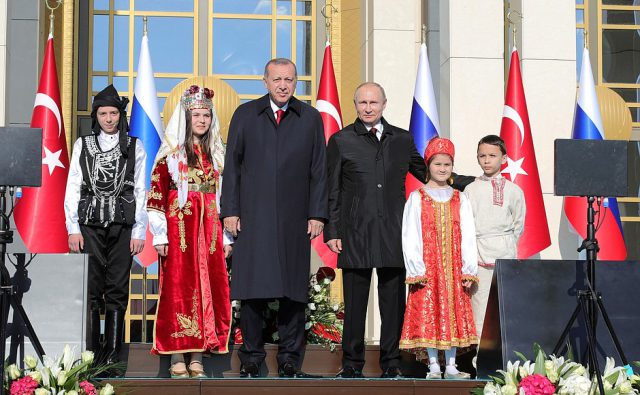Turkey’s pipedreams and NATO’s nightmares

Turkey’s relationship with NATO is at a nadir. Following its recent incursion into Syria’s Afrin district against NATO-backed Kurdish forces, Ankara now finds itself at loggerheads with the United States and other NATO allies.
More troubling, Turkey’s offensive wouldn’t have been possible without the help of Russia: the operation required Russian clearance for Turkish warplanes to enter Syria’s airspace, and Ankara would have heeded assurances from Russia that Syrian forces wouldn’t attempt to seize exposed Turkish positions in Idlib during the offensive in Afrin.
Then there’s the rapid progress on the controversial deal for Turkey to purchase Russian S‑400 Triumf anti-aircraft weapons systems. Turkey expects to receive the first missiles in July next year. US Assistant Secretary of State for European and Eurasian Affairs Wess Mitchell testified to Congress that the purchase and Ankara’s ‘strategic concessions to Moscow in order to achieve its tactical objectives in Syria’ are ‘gravely concerning’.
Also of concern is Turkish–Russian collaboration on energy security. Last month, Russian President Vladimir Putin and Recep Tayyip Erdoğan discussed the construction of Turkey’s first nuclear power plant. The US$26 billion Akkuyu nuclear power station will provide 10% of Turkey’s daily energy needs. Russia will train the personnel—248 Turkish students have already been educated in Russia in a nuclear technology partnership—and supply the nuclear fuel.
NATO has warned that these affronts to the alliance could lead to ‘necessary consequences’ for Turkey. Buying the Russian air defence system could see Ankara excluded from any integrated NATO air defence system. Some have called for the US to remove its B-61 nuclear warheads based at Turkey’s Incirlik air base.
It’s hard to tell how far such punitive measures will go, but underpinning them is a transformation of NATO in Turkey’s eyes from reliable allies to security threats.
What does seem clear is that punitive measures aren’t enough for NATO to force Turkey and Russia apart. That’s because Russia is helping Turkey address a key priority: increasing Turkey’s energy security is a non-negotiable objective for Erdoğan. Turkey relies on imports for almost three-quarters of its domestic energy consumption. Combined with a weakened currency and stubbornly high inflation, Turkey’s increasing energy insecurity could strain its tenuous social fabric, spelling trouble for Erdoğan. Steady economic growth has helped him stay in power.
And now is a particularly vulnerable time. As I wrote earlier, whether Turkey’s heavy investments in Iraqi Kurdistan’s oil industry will pay off is uncertain. After Baghdad’s recapture of the Kirkuk oil fields from the Kurdistan Regional Government late last year, the status of the 300,000 barrels pumped each day through the Kirkuk–Ceyhan pipeline—one‑third of Turkey’s daily consumption—is unclear.
For those reasons, Erdoğan has agreed to what is for all intents and purposes an uneven deal with Russia. Turkey will pay an average price of 12.35 US cents per kilowatt hour for Akkuyu’s electricity output, around three times the world average. But overpaying isn’t new for Erdoğan. Turkey put aside deeply held animosities with the Kurds to embrace risky oil trade agreements in the past.
The Akkuyu agreement doesn’t suggest that Erdoğan wants to be energy dependent on Russia in the long term. It’s even more implausible that he wants a long-term nuclear partnership with Moscow. Given an option to diversify Turkey’s energy resources—such as the planned nuclear power plant sites in Sinop and Igneada in partnership with France, Japan and China—Erdoğan would certainly take it. Further, his long-term goal has been to make Turkey an energy hub and transit corridor for oil and gas supplies, developing relations and drawing resources from across the Middle East and the Caucasus.
However, Russia has made itself Turkey’s key partner in that effort, forging ahead with the TurkStream gas pipeline. While US criticisms of the Russia–Turkey pipeline are justified, if the US doesn’t offer Turkey feasible alternatives, Erdoğan won’t be listening.
So NATO needs to rethink how it approaches Turkey’s increasing belligerence, and put the country’s energy security front and centre. NATO’s New Strategic Concept calls for it to ‘develop the capacity to contribute to energy security’, but its efforts have fallen short. The concept only involves the ‘protection of critical energy infrastructure and transit areas and lines’. That doesn’t go far enough for Turkey.
More than securing vulnerable energy-related infrastructure in a time of need, NATO needs to address vulnerabilities in the energy security of its member states, as well as scope opportunities for increasing energy resilience.
For as long as Erdoğan fears for Turkey’s energy security, he will continue to look for assistance and alliances wherever they can be found.
Amelia Meurant-Tompkinson is a research intern at ASPI. Image courtesy President of Russia.
Δεν υπάρχουν σχόλια:
Δημοσίευση σχολίου